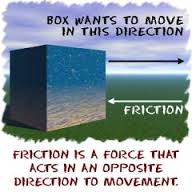记忆方法
记忆“friction”的方法是将其拆分为“fric”和“tion”。想象“fric”就像摩擦两个表面,手指在粗糙的表面上滑过时产生摩擦。这样,“tion”后缀表示动作,整体记忆为“摩擦动作”。
以上内容由AI生成, 仅供参考和借鉴
中文词源
friction 摩擦
来自PIE*bher, 磨擦,转,词源同bore. -ct, 过去分词后缀。
英语词源
- friction (n.)
- 1560s, "a chafing, rubbing," from Middle French friction (16c.) and directly from Latin frictionem (nominative frictio) "a rubbing, rubbing down," noun of action from past participle stem of fricare "to rub, rub down," which is of uncertain origin. Watkins suggests possibly from PIE root *bhreie- "to rub, break." Sense of "resistance to motion" is from 1722; figurative sense of "disagreement, clash, lack of harmony, mutual irritation" first recorded 1761. Related: Frictional.
权威例句
- 1. The friction of the sheets against his skin was torture.
- 被单摩擦着他的皮肤,简直像是酷刑。
- 2. The pistons are graphite-coated to reduce friction.
- 活塞上涂了一层石墨以减小摩擦力。
- 3. the coefficient of friction
- 摩擦系数
- 4. Friction between moving parts had caused the engine to overheat.
- 活动部件的摩擦使发动机过热。
- 5. When Joan returned to work, the friction between them increased.
- 琼回来工作后, 他们之间的摩擦加剧了.
